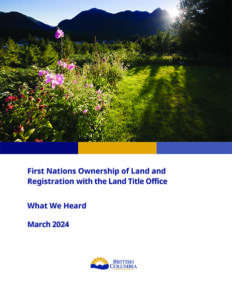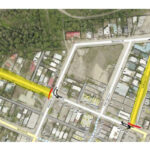Home »

First Nations land ownership report released
 The Province of British Columbia has released a ‘what we heard’ report detailing feedback from recent discussions about proposed legislative amendments that would provide administrative changes to the ways First Nations can own and register private land in B.C.
The Province of British Columbia has released a ‘what we heard’ report detailing feedback from recent discussions about proposed legislative amendments that would provide administrative changes to the ways First Nations can own and register private land in B.C.
Currently, unless enabled by specific legislation, such as through treaties or other federal legislation, the majority of First Nations in B.C. are unable to acquire, hold and dispose of land interests, such as fee simple land and leaseholds, in their own names.
To buy or hold land, most First Nations must undertake the additional administrative processes of setting up a corporation or use alternative arrangements, such as proxies, federal trusts, societies and individual members, to do something that other levels of government and British Columbians often take for granted, a March 21 Ministry of Indigenous Relations and Reconciliation media release explained.
“First Nations in B.C. have long called to all levels of government to remove this discriminatory barrier to land ownership and enable them to directly own land, rather than through proxies such as corporations, societies and individual members,” the ministry said.
The province is proposing to introduce legislative amendments, administrative and enabling in nature, to the Property Law Act and the Land Title Act in the spring 2024 legislative session.
“The focused amendments would specify the capacity of First Nations and introduce the administrative provisions related to the registration of applicable land in the B.C. land title office,” the ministry said.
“These provisions would allow First Nations to be able to purchase and hold private land on par with other British Columbians, organizations and entities. This will reduce the administrative barriers currently facing First Nations, which are recognized as legal entities under federal law (e.g., Indian Act bands).
“First Nations would have a choice for how they will acquire, hold and dispose of land. They could continue to do so under a corporation or choose to own land in the name of the First Nation. This administrative change will provide First Nations with the same rights and obligations that individuals and corporations currently have as landowners,” the ministry explained.
“This proposal addresses the long-standing calls for change and aligns with B.C.’s commitments to reconciliation, including supporting the implementation of the United Nations Declaration on the Rights of Indigenous Peoples through B.C.’s Declaration on the Rights of Indigenous Peoples Act and Truth and Reconciliation Commission Call to Action No. 45.
The province heard a variety of perspectives and ideas on the proposed legislative amendments, which are documented in the “what we heard” report, the ministry concluded.
Read the What We Heard report.
e-KNOW







